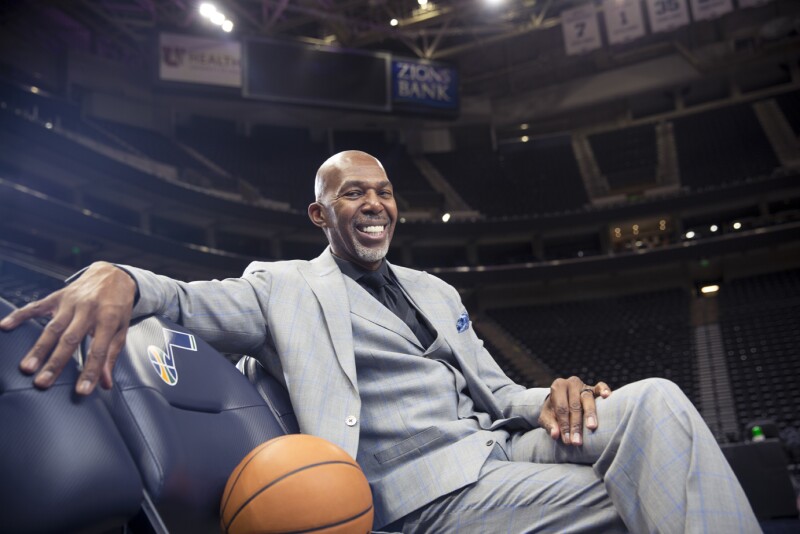Editor’s note: This article was the cover story for the January/February 2022 issue of LDS Living magazine.
Thurl Bailey’s basketball career was coming to a close when he pulled up to a border patrol station in Lugano, Switzerland. After playing 11 seasons in the NBA, he was playing professionally in Italy and drove routinely to Switzerland; gas was cheaper there, and they had a McDonald’s. This border crossing was no different from his previous visits, but as he gave the officer his passport and visa, he was asked three questions that impacted him more deeply than they had during previous crossings: (1) Where have you been? (2) What’s your purpose for coming here today? (3) Where are you headed?
Thurl was used to the questions and usually didn’t think much of them, but he had a lot on his mind on this particular day. The questions hit differently—they felt much more significant than they ever had before. Minutes later, he pulled his car over into a parking lot, needing a moment to think as the three questions resounded loudly in his head.
Where Have You Been?
Thurl still remembers the day he decided to run for vice president in student government at his junior high school. He was pretty confident he was a shoo-in and was excited to tell his mom the plan, but her reaction was not what he had anticipated.
“She didn’t smile at all. She gave me that look, and she said, ‘Why aren’t you running for president?’”
His mom didn’t tell him what to do that day, but she did ask him to think about a simple question: “Are you settling?”
He went back to his Washington, DC-area school, withdrew his name for vice president, and ran for president, which he won by a landslide. But he didn’t stop there. He later became the president of nine school clubs—at the same time.
“[My parents] didn’t necessarily think I would get everything then, but hopefully … I wouldn’t settle, and that moment would come to my mind until it became a natural part of me,” Thurl says.
The message clearly got through. Thurl Bailey is not one to settle. It’s the reason he didn’t give up when he was cut from the basketball team as a 6-foot-5 seventh-grader. It’s the reason that after getting cut yet again in the eighth grade, 6-foot-7 Thurl didn’t let a coach’s insistence that he wasn’t “meant to play this game” keep him from trying again in ninth grade. And it’s the reason why, when a new coach in the ninth grade offered to work with him before and after the team’s practices, Thurl committed completely.
By the time he graduated from high school, Thurl was recruited to play basketball by several universities, but he ultimately landed at North Carolina State University, where his teammates initially described him as more of a trombone player than an athlete. Still, Thurl immediately got playing time as a freshman, averaging 17 minutes a game, and his collegiate career seemed off to a good start. But at the conclusion of his freshman year, something unexpected happened: The coach who had recruited him, Norm Sloan, left NC State for a job at the University of Florida. A few weeks later, a new coach arrived in Raleigh, North Carolina—a New York native in his early 30s named Jim Valvano. Little did Thurl know that Valvano’s arrival wouldn’t just impact his experiences on the court but would also prove to be a hinge point in discovering the purpose of his life.
Coach V
Upon his arrival on campus, Valvano, faced with a team full of players who hadn’t come to Raleigh to play for him, called a team meeting to introduce himself. Thurl didn’t want to go to the meeting—he wanted out. But his mom encouraged him to “stay and just listen,” promising him that if he did, and still didn’t like the guy, they could explore other options.
“He walked in there with his confident walk, which ticked us off even more,” Thurl remembers. But he also recalls Valvano telling the players that if, at the end of the meeting, they still wanted to transfer, he would immediately release them from any responsibility to the team.

“I think the first thing we learned about him was he was willing to risk it. He was willing to risk losing all of us at the very beginning because he was sure that he could sell the fact that he knew he was going to win a championship,” Thurl says. “Those were his words, as selfish as that sounded to me. He said, ‘I know I’m going to win one. I’ve dreamed about it. I know how it looks and feels, and I don’t know if this is the team or not, but I think we can get there.’”
By the end of the meeting, not a single player opted to leave. Valvano’s enthusiasm and confidence were contagious. He made his new team feel like nothing was impossible.
“For some reason what he was selling sounded really good, and he made it sound like if you decide to leave, it’s going to be the worst decision you’ve ever made in your life,” Thurl says, adding that he did involve the Lord in his decision to stay. “Even at that time, I wasn’t making that decision by myself. … Having grown up Baptist, it was always ‘Trust in the Lord.’ It was always ‘Get on your knees and pray about it.’ So I had a really good spiritual foundation as well that was kind of guiding me to make decisions.”
Over the next two seasons, Thurl would lead the North Carolina State Wolfpack in points and rebounds per game. But that national championship? It seemed little more than a fantasy when they didn’t make the tournament in Valvano’s first year and were eliminated in the first round the next year. But Coach V didn’t let his guys lose sight of their goal. In fact, once a year, he came to practice with a pair of gold scissors in hand, and, rather than running drills, Valvano had his team practice cutting down the nets—a longstanding postgame tradition in college basketball. He’d have them run around the court in celebration as if they really had just won.
“What in the world are we doing this for?” Thurl asked himself at the time. “We [were] trying to manufacture these cheers and emotions and [I thought,] ‘I’m not running around a 12,000-foot empty gym like I’m crazy, right?’ We did it, though. He convinced us to do it.”
And before long, Thurl found himself lying in bed at night imagining how he would celebrate if his team really did win the championship.
“So we’d practice again and I’d fall to my knees and put my hands up,” he remembers.
Cardiac Pack
As Thurl’s senior season drew to a close, it seemed highly unlikely that he and his teammates would actually cut down the nets during their collegiate career. With a 17-10 record going into the Atlantic Coast Conference tournament, which they had to win in order to make the NCAA tournament, they were pitted against Michael Jordan and the North Carolina Tar Heels, as well as the University of Virginia team, featuring the three-time national player of the year, 7-foot-4 Ralph Sampson. But Thurl and his teammates won the ACC tournament and earned their right to play in the “Big Dance.”
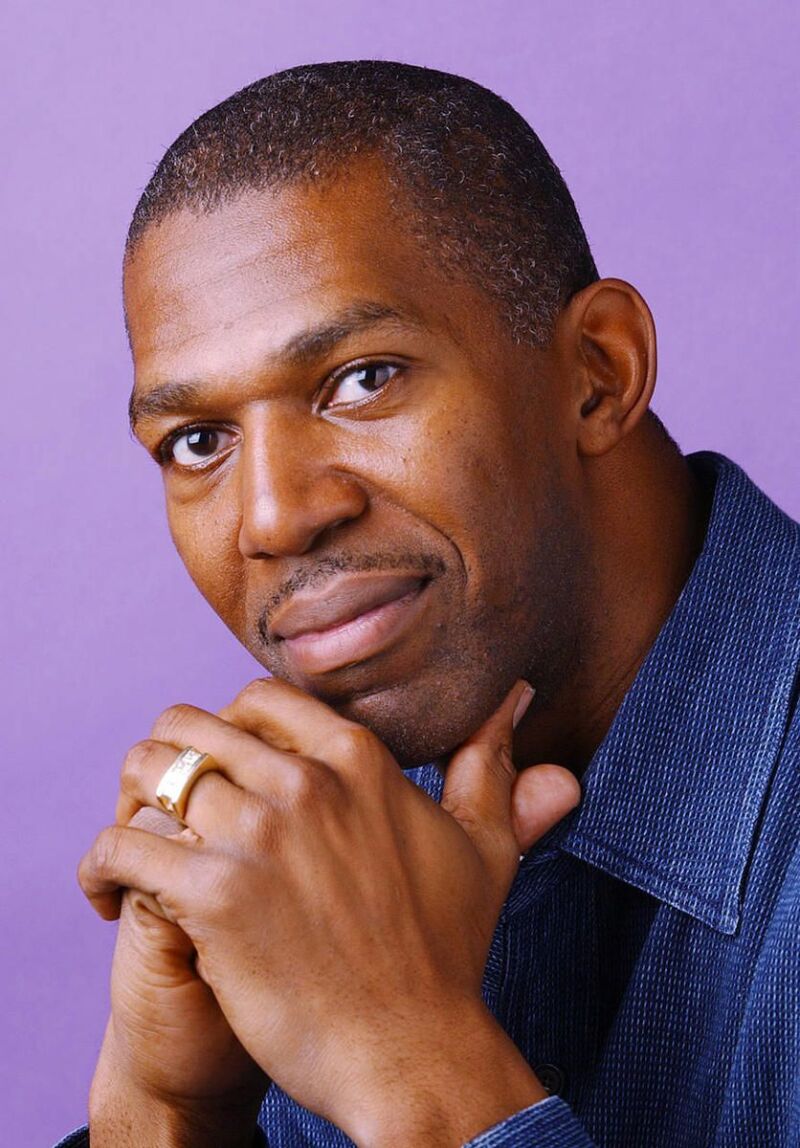
In the first round of the tournament, with one minute to go and down by six in overtime against Pepperdine, it seemed the Wolfpack’s NCAA tournament run would be short-lived. But that’s when miracles started to happen for NC State. A Pepperdine four-year 84 percent free-throw shooter missed at the line twice in the last 45 seconds of the game, giving the Wolfpack the chance to make a comeback and force a second overtime, where they outlasted Pepperdine.
The second round pitted NC State against a very good No. 3 seed team from the University of Nevada, Las Vegas. Prior to the game, Sidney Green, a forward for UNLV, was asked by the media if he had watched NC State’s previous game.
“Bailey didn’t impress me,” Green said after answering in the affirmative. “I ain’t worried about Bailey.”
In “Survive and Advance,” an episode in ESPN’s 30 for 30 documentary series, Thurl’s teammate Dereck Whittenburg recalled that while Thurl took Green’s comments in stride, they riled up his teammates.
“Thurl’s soft-spoken and he says, ‘I’m going to let my playing do the talking.’ We took it more personal than Thurl did,” Whittenburg said, adding that Thurl’s teammates kept feeding their big man the ball.
In the end, Thurl’s playing did do the talking. He finished with 25 points and nine rebounds, leading the Wolfpack to a thrilling 71-70 victory. “How good is Thurl Bailey now?” one of his teammates asked in postgame interviews.
The heart-stopping nature of their miraculous finish earned Thurl and his teammates the nickname “Cardiac Pack,” and they would find themselves on the ropes once more as they faced Virginia in the Elite Eight—another game they won by just one point. They would go on to beat Georgia in the Final Four, but then the Wolfpack faced their own Goliath, as they would have to beat Houston to take home a trophy. But just before the horn expired, a last-second tip-in by NC State’s Lorenzo Charles off a Whittenburg miss handed the Wolfpack the win and gave the world what Sports Illustrated would later dub the greatest college basketball moment of the 20th century.
Having finally reached the goal, Thurl fell to his knees—just as he’d practiced—tears streaming down his face.
In the years since Thurl has been called the heart and soul of that 1983 championship team.
“Thurl led by example,” teammate Lorenzo Charles, who has since passed away, was quoted as saying in Tim Peeler’s book When March Went Mad. “He worked hard in practice every day. What he did in practice led to production. He was our quiet leader. He just went out there and laid it on the line every night and everyone else just tried to follow. You could tell playing basketball meant a lot to Thurl. He was a little on the emotional side. That’s what basketball should be for a player. You can’t just throw on your sneakers and go out there and play. The game has to mean something. It’s got to be one of the most important things in the world to you. And it was for Thurl.”
A Reason to Hope
As the years have passed, Thurl realized that the Cardiac Pack’s journey meant something, not just for the players on the court or the fans in the stands; their Cinderella story inspired people watching worldwide. “We gave people a reason to hope and believe in themselves—in something,” Thurl says.
His wife, Sindi, knew nothing about the national championship team when she met Thurl in 1989, but she calls his becoming a champion one of the defining moments of her husband’s life.
“We can’t go anywhere, even outside the country, without someone stopping us and talking about 30 for 30 or the national championship, and for some of these people, it was life-changing. I think it was definitely one of the defining moments of basketball for him [and for] who he is.”
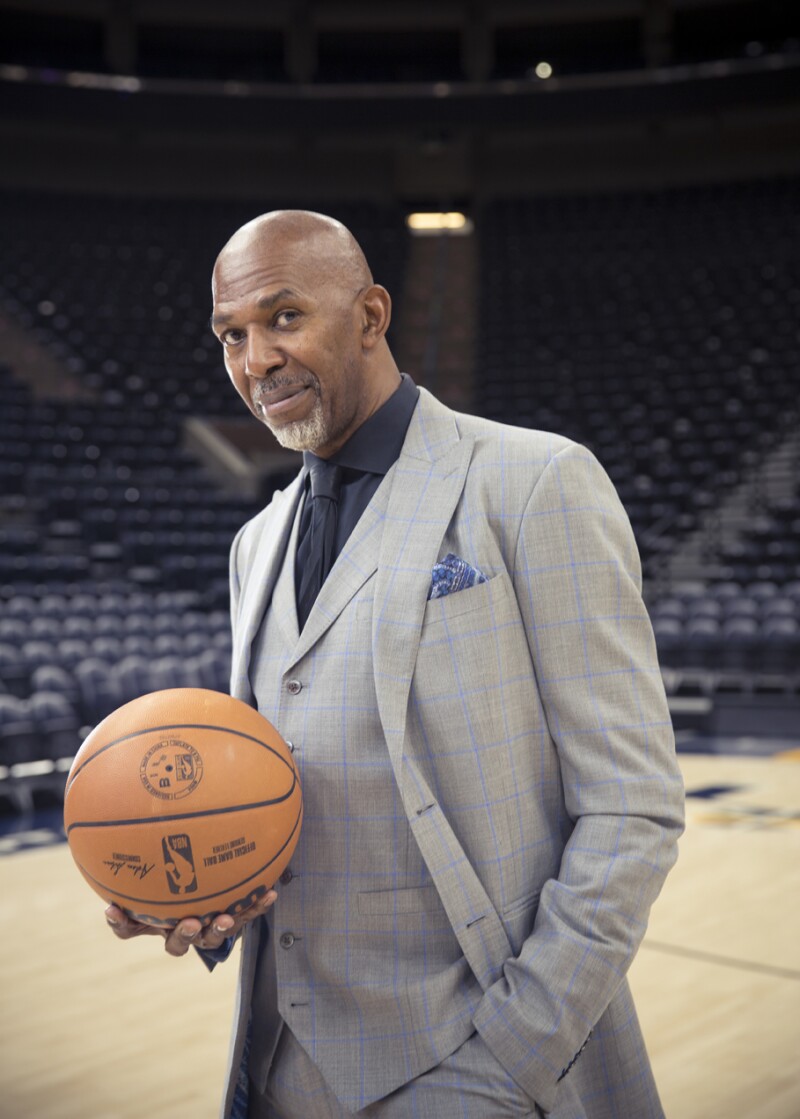
Something changed in Thurl that day in the NCAA finals. He became a champion, and it changed the expectation he has had for himself ever since.
“I want to champion things. I want to be a champion for people. I want to be a champion husband, grandpa, dad. … I don’t have to watch the documentary about our team because I lived it. I know it. I’m continuing to live different parts of that journey in my life,” he says.
It’s true. The story of that 1983 national championship team was far from over when they cut down the nets on April 4 of that year.
“It didn’t all end well. Coach V passed away from cancer, and Lorenzo Charles died in a bus accident, but the hope never goes away, right? The story is still there,” Thurl says. “And that would, I think, be the biggest thing that we taught and continue to teach—is that you can be extraordinary. You don’t have to be someone who has a lot of money or fame; you just have to believe. You have to have this sense of wonder … and we built that. V helped us build that. And even if we hadn’t won the championship, even if the story hadn’t ended that way, it was a heck of a ride. It could’ve ended at any time, but it didn’t. … Somebody’s going to win a national championship, so why not us?”
What Is Your Purpose?
The Utah Jazz had the seventh pick of the 1983 NBA draft, and Coach Valvano encouraged the Jazz front office to draft Thurl.
“Don’t think of Thurl as just a player,” he told them. “As a person, he will be good for the team and the community.”
The statement proved to be prophetic. Nearly 40 years later, while many other players have come and gone, Thurl Bailey has been and continues to be a staple in Utah. In February 2021, he was even honored by the Utah legislature for his contributions to the state.
“It’s hard to put into words—almost impossible—the influence and impact that Thurl Bailey has had on our state, not just our communities here in Utah, but the nation, the world,” said Attorney General Sean Reyes at the time.
Gail Miller, who with her husband, Larry H. Miller, bought the Utah Jazz in 1986, says Thurl set a tone for younger players who played for the Jazz in subsequent years.
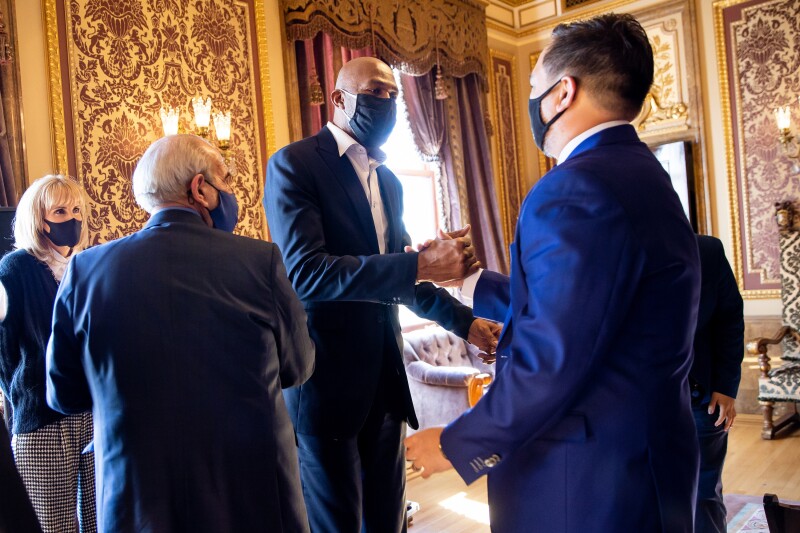
“He was able to mentor younger players as time went on and help bring in that culture and help them understand how important it is to a winning team to have a good character basis and to be compatible with how you interact in the community,” Miller says before adding, “I’d like to recognize what a fine person he is through and through. His sense of goodness comes through everywhere he is, and he’s willing to share it.”
But when asked about his contributions to the community, Thurl becomes emotional. “I like to look at it as this community has done a lot for me,” he says.
He is quick to note that it was in Utah that he was initially introduced to The Church of Jesus Christ of Latter-day Saints. And it was also in Utah that he met Sindi Southwick, a tall, blonde Latter-day Saint basketball player for Utah Valley University. Sindi and Thurl met while working at a Junior Jazz camp, and she was immediately struck by how different he seemed from other athletes she had been around. The two worked camps together for years before he finally asked her out. And when he did, people around them, including both of their families, were not happy.
“People didn’t know anything about us. They could just see us from the outside. There’s a Black guy from probably one of the worst neighborhoods in America that is Baptist that is now dating a white girl from a farm town in Utah that is Mormon. A Mormon and a Baptist, farm town, ghetto—I mean, as opposite as you can get. So from the outside looking in, yeah, it probably didn’t look like it was going to work,” Sindi says.
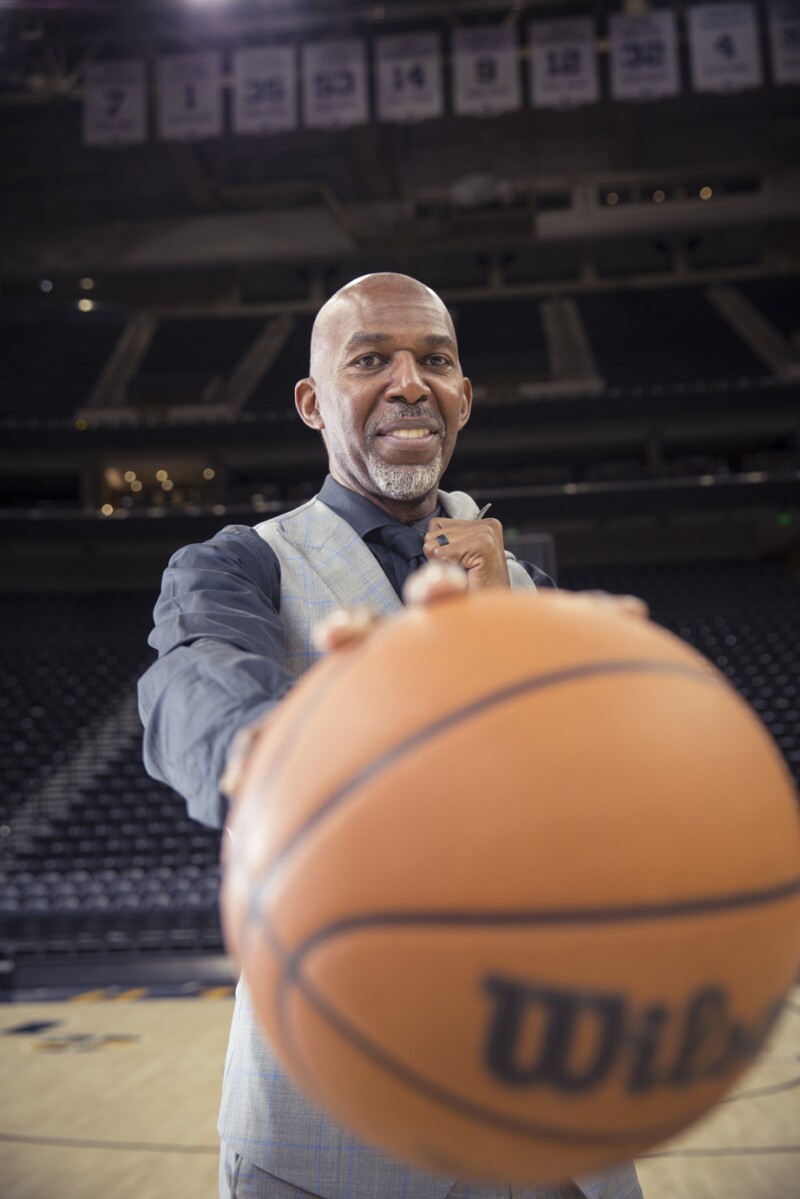
But Thurl, who had already experienced the pains of a failed first marriage, saw something in Sindi. He didn’t know what all of her beliefs meant, but he watched her. “She was a great example to me when I could’ve lost faith and confidence,” he says. Likewise, Sindi saw something in Thurl.
“Thurl, before he ever joined the Church, was one of the most Christlike people I have ever met,” she says of her husband of nearly 30 years. “Whether he was baptized or not, he was one of the greatest, kindest human beings that I’ve ever met, and a lot of people just didn’t give that a chance—they didn’t give us a chance. . . . We’ve gone through a lot of adversity, [but] we’ve made it through, and it’s made us better.”
Thurl and Sindi were married in 1994 and sealed in 1997. The couple has six children combined—three from their marriage and three that Thurl had previously. He is a believer in destiny but also that our decisions impact our destiny.
“I didn’t have to come to Utah. I could’ve been drafted somewhere else. I didn’t have to fall in love with a girl who was raised in the Church and [who] understood me, understood my heart,” Thurl says. “We could’ve chosen to have gone our separate ways, but she didn’t give up on me. I didn’t give up on her.
“You make your own decisions, good or bad, and don’t worry about what other people say. My spiritual foundation did nothing but grow over the course of my life with little detours here and there [before] coming back and understanding really what I wanted in my life.”
It’d Be Thurl Bailey
Gail Miller remembers her late husband, Larry, speaking from time to time of conversations he had with a player named Thurl Bailey—conversations about more than basketball. She recalls her husband saying that if any of the players on the Jazz roster were going to join the Church, he thought it’d be him. But while Thurl’s time with the Utah Jazz certainly introduced the NBA big man to the Church, he played for the team for 10 seasons without joining. And when he left to play for the Minnesota Timberwolves in 1991, it may have seemed that the odds of him being baptized were pretty much gone.
Sindi Bailey says she always knew Thurl would become a member of the Church, but she will never forget the day he told her he was ready to make the commitment.
“I remember everything that happened that day. … It’s like it just happened,” she says. “I can picture it in my mind, every time somebody asks about it. I can remember where I was, how I felt, what was happening at that time.”
The couple, along with their new baby, was living in Italy but Sindi had flown back to the United States for her grandmother’s funeral when she got a call from Thurl.
“I could hear him, but he wasn’t speaking,” she says. “I could hear him sniffling. If you know Thurl, he’s pretty emotional, … and all I said was, ‘You’ve committed to be baptized, haven’t you?’”
Thurl’s father-in-law, who had originally opposed the couple’s marriage, flew to Italy to baptize Thurl on New Year’s Eve, 1995. Thurl says the gospel of Jesus Christ brought clarity into his life that, despite being raised with a strong testimony in Christ, wasn’t there before.
“I love my Baptist upbringing, but I knew that there was more … and I hoped that at some point, knowing I was a God-fearing man, I would stay on the right path to be led to it,” he says.
He has never looked back since being baptized, and Sindi says the gospel has made all the difference in their marriage.
“We would never be where we are today without it. There’s no way we could’ve gotten through everything we did without prayer, without faith, without scriptures, and all of that is part of the gospel. … Without the gospel, we would never have made it. There’s no way.”

The gospel has given Thurl a very clear answer to the second question asked at the border of Italy and Switzerland.
“My purpose is to serve,” he says. “My purpose is to be a servant of the Lord and do that in a way that satisfies Him. Ultimately, I’m not always conscious of what I should be doing. There are times where I juggle a lot of balls, but whatever that is, there’s a certain way I’m supposed to do it. There’s a certain way I’m supposed to represent Him.”
But Thurl is still trying to figure out the answer to that final question: Where are you headed? He holds to his beliefs about life after death, but in the here and now, he is still open to what the Lord has in store for him next. So sometimes, late at night, he lies in bed and, instead of imagining what it would be like to win a national championship, he visualizes what it will take to be a champion in life.
“I’m still doing it every day—as a dad, as a grandpa,” Thurl says.
Thurl is a big believer that once you are a champion, you should live a life worthy of that title. And maybe that’s why his eyes still light up and he stands a little straighter when he recalls the question he is asked almost everywhere he goes:
“Hey, you’re that guy that won the national championship with Jimmy Valvano?”
“Yes sir, I am.”

